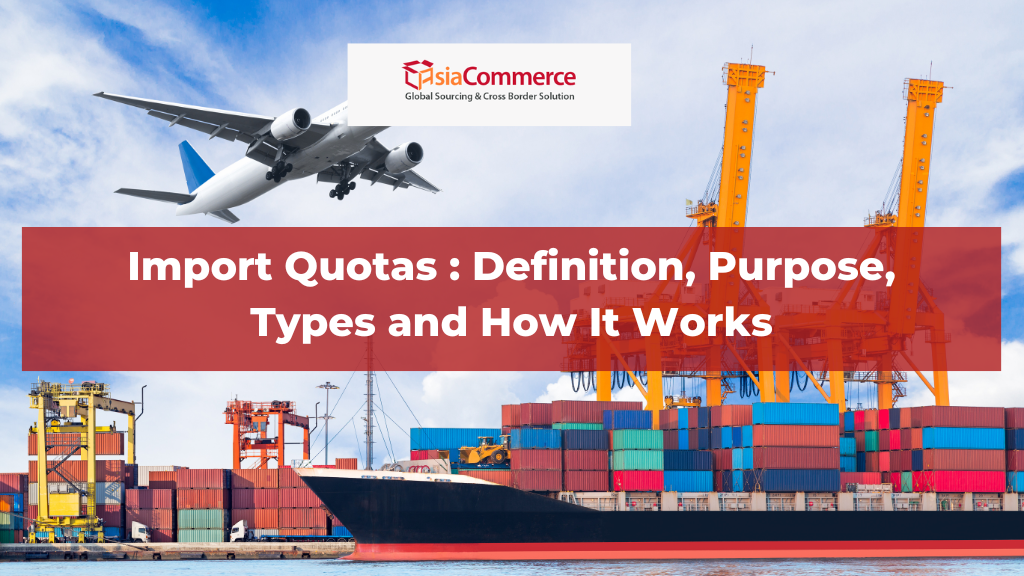When engaging in international trade, understanding the concept of import quotas is vital, especially for businesses looking to import goods into the United States. Import quotas play a critical role in regulating the flow of goods across borders, protecting domestic industries, and maintaining economic stability.
This article explores the definition, purpose, types, and how import quotas work, providing actionable insights for businesses aiming to navigate international trade successfully.
What Are Import Quotas?
The government imposes import quotas as trade restrictions that limit the quantity or value of specific goods that can be imported into a country within a given timeframe. These restrictions are designed to control the supply of foreign products and ensure a balanced trade environment.
Unlike tariffs, which impose taxes on imported goods, import quotas directly cap the amount that can be brought into a country. This makes them a powerful tool for managing trade relationships and supporting domestic industries.
For instance, the U.S. might impose import quotas on textiles or agricultural products to balance the trade market and protect local businesses. Import quotas are particularly effective in industries vulnerable to intense foreign competition, where price differences can heavily impact local market dynamics.
The Purpose of Import Quotas

1. Protecting Domestic Industries
By restricting the number of imported goods, quotas help protect local businesses from foreign competition. This is especially important for industries that are still developing or struggling to compete globally. For example, emerging industries like renewable energy manufacturing might benefit from quotas that limit cheaper imports.
2. Maintaining Economic Stability
Limiting imports helps to control the supply of goods in the market, stabilizing prices and preventing oversaturation. This ensures local producers remain competitive without being undercut by foreign manufacturers.
3. Encouraging Fair Trade Practices
Import quotas can prevent dumping, where foreign companies flood the market with cheap goods to undercut local businesses. Dumping not only disrupts local industries but can also lead to monopolistic practices when domestic competitors are forced out of the market.
4. Managing Foreign Exchange Reserves
By restricting imports, governments can preserve foreign exchange reserves, which are crucial for economic stability. This is particularly relevant in economies where foreign currency reserves are needed to stabilize national currency values and manage debt repayments.
5. Promoting Strategic National Goals
Certain quotas align with broader national goals, such as energy independence or food security. For instance, import quotas on specific energy resources or staple foods can drive local production, reducing dependency on foreign suppliers.
Also Read : Recommendations for 10 China Key Exports Commodities to United States
Types of Import Quotas :
Understanding the various types of import quotas can help businesses better navigate trade regulations :
1. Absolute Quotas
An absolute quota sets a strict limit on the quantity of a product that can be imported during a specific period. Once the limit is reached, no further imports of that product are allowed. For example, the U.S. may impose an absolute quota on certain agricultural products to protect local farmers and ensure fair market competition. Absolute quotas are often implemented to safeguard critical industries or maintain the economic balance of trade.
2. Tariff-Rate Quotas (TRQs)
Tariff-rate quotas allow a specific quantity of goods to be imported at a lower tariff rate, while imports exceeding the quota face significantly higher tariffs. This type of quota is commonly used in the U.S. for agricultural products like sugar and dairy.
TRQs strike a balance between promoting trade and protecting domestic industries, offering incentives to stay within quota limits while penalizing excessive imports.
3. Country-Specific Quotas
These quotas allocate specific import limits to certain countries, often as part of trade agreements. For example, the U.S. may set country-specific quotas on steel imports from Canada or Mexico under the USMCA agreement. Country-specific quotas can also reflect diplomatic or economic relationships, encouraging trade from preferred nations while limiting imports from others.
4. Global Quotas
Global quotas apply uniformly to all countries exporting a particular product, ensuring fair treatment across trading partners. These quotas are commonly used when a country wants to regulate imports without singling out specific trading partners.
5. Bilateral Quotas
Bilateral quotas are specific trade agreements between two countries that establish limits on the quantity or value of certain goods that can be traded between them within a specific period. These quotas are designed to manage trade relationships, balance trade flows, and often serve diplomatic or strategic purposes.
Unlike global quotas, which apply to all trade partners, bilateral quotas are exclusive arrangements. For example, the U.S. might have a bilateral quota with a specific country, such as Japan, to limit the amount of steel or agricultural products imported or exported between the two nations.
Also Read : Customs Clearance Process : Definition, Process, and Required Documents
How Do Import Quotas Work?
1. Implementation by Governments
Governments impose quotas through trade agreements or domestic policies. In the U.S., agencies like the International Trade Administration (ITA) oversee the enforcement of import quotas. These policies are typically communicated through regulatory documents, providing clear guidelines for importers.
2. Licensing and Allocation
Importers must often obtain licenses to import goods under a quota system. These licenses detail the quantity of goods allowed for import within the quota limit. For businesses, acquiring these licenses is often a competitive process, as exceeding quotas can lead to financial penalties or denied shipments.
3. Monitoring and Enforcement
Customs agencies monitor imports to ensure compliance with quotas. Any goods exceeding the quota may be denied entry, confiscated, or subjected to high tariffs. Advanced tracking systems, such as automated customs declarations, have made monitoring more efficient in recent years.
4. Impact on Businesses
Import quotas can influence supply chains, pricing strategies, and market competition. Businesses need to plan imports carefully to avoid penalties or supply disruptions. For instance, seasonal industries like fashion or agriculture must be especially mindful of quota limits during peak periods.
Want to Import Goods Without Hassle? Let’s Consult Free Now!
Here’s the explanation about import quotas. If you’re having trouble with import quotas, you can use the import solution services from AsiaCommerce. All you need to do is tell us what product you want to import, and we’ll find the best product for you.
Moreover, you don’t need to worry about handling customs documents or shipping. We’ll take care of all the processes, and your goods will be safely delivere to your destination. This way, you can focus more on growing your business.
So, what are you waiting for? Click here or the banner below to get the convenience of importing right now!


0 Comments